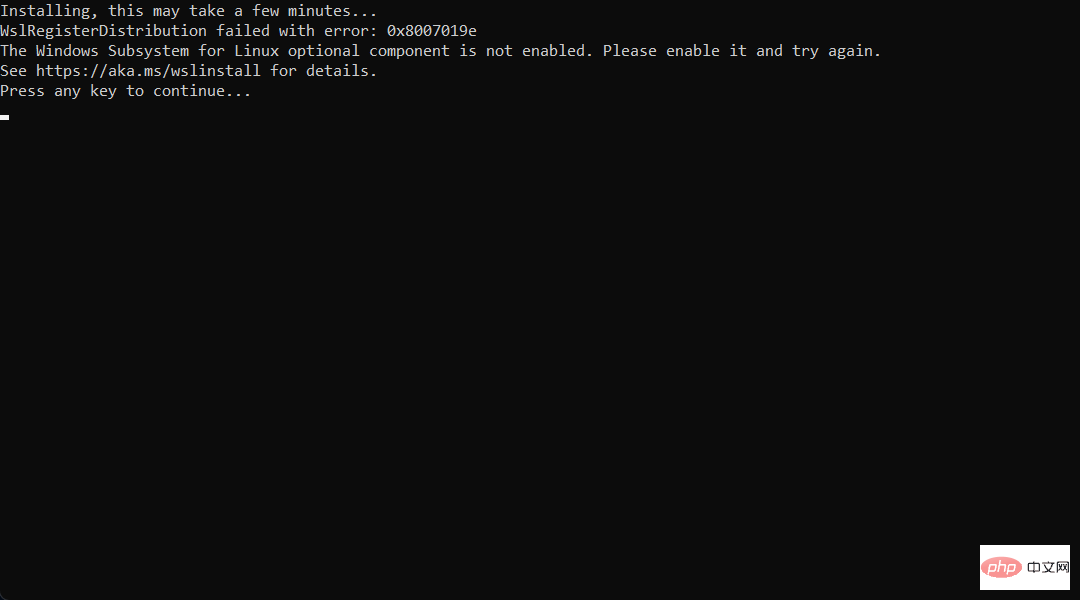 Operation and Maintenance
Operation and Maintenance Linux Operation and Maintenance
Linux Operation and Maintenance How to solve database connection interruption problem on Linux server
How to solve database connection interruption problem on Linux serverHow to solve the problem of database connection interruption on Linux server
On Linux server, database connection interruption is a common problem. This situation may result in data loss, system crash, or server failure. Therefore, it is very important to solve the problem of database connection interruption. Here are some methods and suggestions for solving this problem.
- Check the network connection: First check the network connection of the server. If the network connection is unstable or interrupted, the database connection may be interrupted. You can check whether the network connection between the server and the database server is normal by running the ping command. If there is a problem with the network connection, you should repair the network or restart the server to resolve the issue.
- Check the status of the database server: The status of the database server may also cause the connection to be interrupted. You can use command line tools or the web interface to check the status of the database server. If the database server is found to be faulty or down, appropriate measures should be taken to restore the normal operation of the database server.
- Check the server log: The log file of the Linux server records the operation of the system and applications. You can view the server's log files, such as /var/log/messages, /var/log/mysql/error.log, etc., to check whether there are related errors or warning messages. Based on the information in the log file, you can determine the cause of the database connection interruption and take appropriate measures to solve the problem.
- Restart the database service: If the database connection interruption is a temporary problem, you can try to restart the database service to solve the problem. You can use the command line to restart the database service, such as service mysql restart. Before restarting the database service, you should ensure that important data in the database has been backed up to prevent data loss.
- Optimize database connection settings: Database connection settings may also affect the stability of the connection. You can check the parameters of the database connection, such as connection timeout, maximum number of connections, etc. These parameters can be adjusted appropriately according to the server configuration and load conditions to improve the stability of the database connection.
- Use connection pool: Connection pool is a tool that can manage and reuse database connections. Using a connection pool can reduce the creation and destruction of connections and improve the performance and stability of the database. You can use some open source connection pool tools, such as c3p0, HikariCP, etc., to manage database connections.
- Maintain the health status of the database: Regularly maintaining the health status of the database is also an important measure to prevent connection interruptions. You can regularly clean up junk data in the database, optimize the database index, back up the database, etc. These maintenance tasks can improve the performance and stability of the database and avoid connection interruptions.
In addition to the above methods and suggestions, you can also refer to the official database documentation, ask questions on the technical forum, etc. to seek more help and solutions. Troubleshooting database connection outages requires patience and care, and it may take an experienced administrator multiple attempts and adjustments to resolve the issue. Caution should be exercised when resolving connection interruptions to avoid unnecessary interference with the normal operation of the database.
The above is the detailed content of How to solve database connection interruption problem on Linux server. For more information, please follow other related articles on the PHP Chinese website!
 Linux服务器的SSH连接断开问题如何解决?Jun 30, 2023 pm 08:27 PM
Linux服务器的SSH连接断开问题如何解决?Jun 30, 2023 pm 08:27 PM如何解决Linux服务器上的SSH连接中断问题随着云计算和远程工作的普及,远程连接到Linux服务器成为了日常工作中不可或缺的一部分。然而,有时SSH连接可能会出现中断的情况,给我们带来不便和困扰。本文将分享一些解决Linux服务器上SSH连接中断问题的方法,帮助您更好地管理和维护服务器。一、网络问题首先,我们需要排除网络问题。网络稳定与否直接影响到SSH连
 想在 Windows 11 上安装 AlmaLinux?这是怎么做的Apr 30, 2023 pm 08:13 PM
想在 Windows 11 上安装 AlmaLinux?这是怎么做的Apr 30, 2023 pm 08:13 PM在MicrosoftStore中,现在有一个版本的AlmaLinux与适用于Linux的Windows子系统兼容。这为用户提供了一系列令人印象深刻的新选项,因此我们将向您展示如何在Windows11上安装AlmaLinux。它于2021年3月发布,提供了第一个稳定的生产版本,此后该非营利基金会增加了许多新成员。最近的AMD是上个月加入的,时间是2022年3月。借助适用于Linux的Windows子系统,在Windows和Linux世界中工作的开
 如何解决Linux服务器上的SSH连接中断和拒绝问题Jun 29, 2023 am 09:02 AM
如何解决Linux服务器上的SSH连接中断和拒绝问题Jun 29, 2023 am 09:02 AM如何解决Linux服务器上的SSH连接中断和拒绝问题在日常的运维工作中,使用SSH(SecureShell)进行远程连接是非常常见的操作。尽管SSH是一种安全可靠的协议,但有时仍然会遇到连接中断和拒绝的问题。这些问题可能由于各种原因引起,本文将介绍一些常见的解决方法。检查网络连接首先,确认服务器和本地机器之间的网络连接是否正常。可以通过ping命令来测试服
 Linux服务器安全:使用命令检查系统漏洞Sep 08, 2023 pm 03:39 PM
Linux服务器安全:使用命令检查系统漏洞Sep 08, 2023 pm 03:39 PMLinux服务器安全:使用命令检查系统漏洞概述:在当今的数字化环境中,服务器安全性是至关重要的。针对已知漏洞进行及时的检测和修复,能够有效地保护服务器免受潜在的攻击威胁。本文将介绍一些常用的命令,可用于在Linux服务器上检查系统漏洞,并提供相关的代码示例。通过正确使用这些命令,您将能够增强服务器的安全性。检查系统更新:在开始进行漏洞检查之前,确保您的系统已
 提供更强大的Web接口安全性:Linux服务器的关键实践。Sep 08, 2023 pm 12:51 PM
提供更强大的Web接口安全性:Linux服务器的关键实践。Sep 08, 2023 pm 12:51 PM提供更强大的Web接口安全性:Linux服务器的关键实践在当今的数字时代,Web接口安全性变得越来越重要。随着越来越多的应用和服务转移到云端,服务器安全保护也日益成为关键问题。Linux作为最常用的服务器操作系统之一,其安全性的保护至关重要。本文将介绍一些关键实践,帮助您提供更强大的Web接口安全性。更新和维护操作系统和软件及时进行操作系统和软件的更新是服务
 Linux服务器安全加固:配置和优化您的系统Sep 08, 2023 pm 03:19 PM
Linux服务器安全加固:配置和优化您的系统Sep 08, 2023 pm 03:19 PMLinux服务器安全加固:配置和优化您的系统引言:在当今信息安全威胁日益增加的环境中,保护您的Linux服务器免受恶意攻击和未经授权的访问变得至关重要。为了加固系统安全,您需要采取一系列的安全措施,以保护您的服务器和其中存储的敏感数据。本文将介绍一些关键的配置和优化步骤,以提高您的Linux服务器的安全性。一、更新和管理软件包安装最新的软件包和更新对于保持系
 Linux服务器上常见的日志文件损坏问题及其修复方法Jun 29, 2023 pm 06:00 PM
Linux服务器上常见的日志文件损坏问题及其修复方法Jun 29, 2023 pm 06:00 PMLinux服务器上常见的日志文件损坏问题及其修复方法摘要:日志文件是Linux服务器中非常重要的组成部分,它记录了系统运行过程中的各种操作和事件。然而,由于各种原因,日志文件有时会出现损坏问题,导致服务器无法正常分析和调试。本文将探讨一些常见的日志文件损坏问题,并提供相应的解决方法。引言:在Linux服务器运行过程中,日志文件扮演着至关重要的角色。它们记录了
 Linux服务器防御:保护Web接口免受恶意文件上传攻击。Sep 09, 2023 am 09:06 AM
Linux服务器防御:保护Web接口免受恶意文件上传攻击。Sep 09, 2023 am 09:06 AMLinux服务器防御:保护Web接口免受恶意文件上传攻击近年来,随着网络的普及和发展,Web应用程序的使用越来越广泛。然而,与之伴随而来的是各种安全威胁,其中之一就是恶意文件上传攻击。恶意文件上传攻击是指攻击者向服务器上传包含恶意代码的文件,从而获取服务器权限或者传播恶意内容。为了保护Web接口免受恶意文件上传攻击,我们可以采取一些有效的防御措施。下面将介绍


Hot AI Tools

Undresser.AI Undress
AI-powered app for creating realistic nude photos

AI Clothes Remover
Online AI tool for removing clothes from photos.

Undress AI Tool
Undress images for free

Clothoff.io
AI clothes remover

AI Hentai Generator
Generate AI Hentai for free.

Hot Article

Hot Tools

SAP NetWeaver Server Adapter for Eclipse
Integrate Eclipse with SAP NetWeaver application server.

Dreamweaver Mac version
Visual web development tools

SecLists
SecLists is the ultimate security tester's companion. It is a collection of various types of lists that are frequently used during security assessments, all in one place. SecLists helps make security testing more efficient and productive by conveniently providing all the lists a security tester might need. List types include usernames, passwords, URLs, fuzzing payloads, sensitive data patterns, web shells, and more. The tester can simply pull this repository onto a new test machine and he will have access to every type of list he needs.

SublimeText3 Linux new version
SublimeText3 Linux latest version

EditPlus Chinese cracked version
Small size, syntax highlighting, does not support code prompt function




